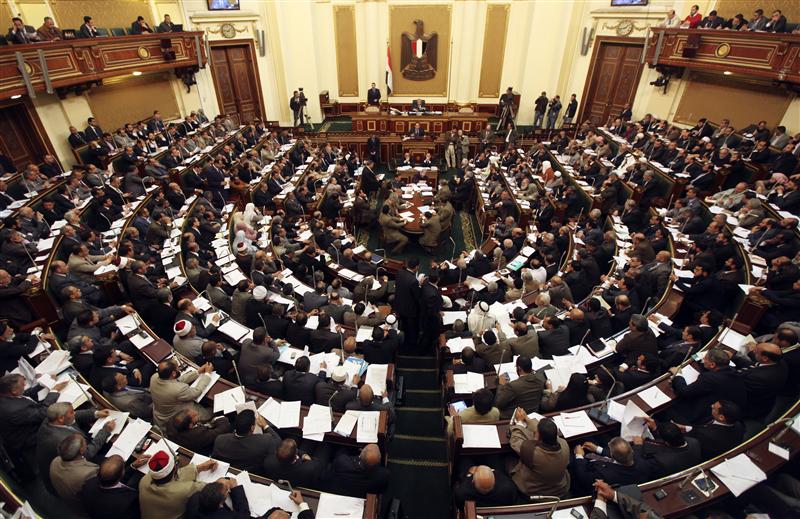Latest NEWS
- Aswat Masriya, the last word
- Roundup of Egypt's press headlines on March 15, 2017
- Roundup of Egypt's press headlines on March 14, 2017
- Former Egyptian President Hosni Mubarak to be released: lawyer
- Roundup of Egypt's press headlines on March 13, 2017
- Egypt's capital set to grow by half a million in 2017
- Egypt's wheat reserves to double with start of harvest -supply min
- Roundup of Egypt's press headlines on March 12, 2017
Long-awaited Egyptian parliament's first session convenes

Archive photo of gthe Egyptian parliament. Amr Dalsh - Reuters
CAIRO,Jan. 10 (Aswat Masriya) - Egypt’s new parliament, the House of Representatives, began its first session at 9 am on Sunday.
The representatives have begun taking their parliamentary oaths.
Following this, they will be invited to elect the parliament speaker. The speaker of the procedural process will ask the representatives who wants to run, and the members will vote.
The elected parliament speaker will be announced at the end of the session.
Bahaa Abu Shaqa, 77, the eldest member of the parliament is the opening and lead speaker of the procedural session, in accordance with the house's regulations.
The two youngest members Hassan Hussein and Noha al-Hemeily, 26, are the deputy speakers.
The House is comprised of 596 members, 448 are individual candidates, 120 elected through lists and 28 appointed by the president.
This is the third parliament to be elected in the past five years. In 2011, after the ouster of former president Hosni Mubarak in a popular uprising against his rule, the Supreme Council of the Armed Forces (SCAF) that ruled the country in the post-Mubarak transitional period ordered the dissolution of the 2010 parliament, which was primarily made up of the National Democratic Party that Mubarak headed.
In 2012, a new parliament was elected in which Islamist parties made up the majority. The SCAF ordered the dissolution of the parliament after the Supreme Constitutional Court deemed the election process for the parliament unconstitutional.
In July 2013, following the ouster of former president Mohamed Mursi, then-Defence Minister Abdel Fattah al-Sisi announced “a roadmap to democracy” that included parliamentary elections as a final step, preceded by the drafting of a new constitution and electing a president. The two steps were completed in January and May 2014 consecutively.
Mursi, who hails from the Muslim Brotherhood, was ousted by the military following mass protests against his rule. He is currently in jail, facing a string of charges in more than one court case.
The 2016 House of Representatives is the first legislature elected since 2012. The elections held recently constituted the first time in 30 years for parliamentary elections to held in the absence of the Muslim Brotherhood, which was designated a "terrorist organization" in December 2013 by virtue of a decision issued by the then interim post-Mursi government. Scores of Brotherhood leaders and members have been convicted or are still facing trial on charges like inciting violence.
During the absence of a parliament, the president held legislative powers, on condition that upon the election of a new parliament all the legislations passed by the president should be discussed and approved by the House within 15 days of its commencement, according to article 156 of the 2014 Egyptian constitution.
In a joint statement issued Saturday, Egyptian human rights organisations, including the Cairo Institute for Human Rights (CIHR) and the Egyptian Initiative for Personal Rights (EIPR), among others called on the parliament to reevaluate the decrees that have been issued since the ratification of the constitution in 2014.
In addition, the groups called on the members to ensure a comprehensive confrontation of terrorism that does not depend on security actions that do not respect freedom of expression and other constitutional rights. It also called on the members to put an end to the law of "transitional justice," which represents a type of "emergency law." Finally the groups called on the parliament to respect human rights, social and economic rights, and children's rights.
Sunday's state-run newspapers have called the 2016 House "the June 30 parliament" in reference to the protests that preceded Mursi's ouster as president.










